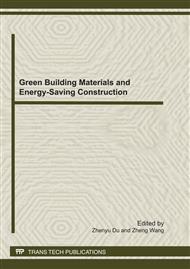[1]
Baizhan Li, Runming Yao: Urbanisation and its impact on building energy consumption and efficiency in China, Renewable Energy 34 (2009), p.1994–(1998).
DOI: 10.1016/j.renene.2009.02.015
Google Scholar
[2]
S. Munkhiargal, V.Z. Manusov: Artificlal Neural Network Based Short-Term Load Forecasting, KORUS (2004), pp.262-264.
DOI: 10.1109/korus.2004.1555339
Google Scholar
[3]
Mohsen Hayati, Yazdan Shirvany: Artificial Neural Network Approach for Short Term Load Forecasting for Illam Region, World Academy of Science, Engineering and Technology 28 (2007), pp.280-284.
Google Scholar
[4]
Li Wei, Shang Yumin: Prediction of Energy Production and Energy Consumption based on BP Neural Networks, Knowledge Acquisition and Modeling Workshop (2008), pp.176-179.
DOI: 10.1109/kamw.2008.4810454
Google Scholar
[5]
Information on http: /baike. baidu. com/view/66707. htm.
Google Scholar
[6]
Betul Bektas Ekici *, U. Teoman Aksoy: Prediction of building energy consumption by using artificial neural networks, Advances in Engineering Software 40 (2009), p.356–362.
DOI: 10.1016/j.advengsoft.2008.05.003
Google Scholar
[7]
Yuan Ma, Jun-qi Yu and so on: Study on Power Energy Consumption Model for Large-scale Public Building, ISA 2010 2nd International Workshop (2010), pp.1-4.
DOI: 10.1109/iwisa.2010.5473608
Google Scholar
[8]
Tuğçe Kazanasmaz, Murat Günaydin, Selcen Binol. Artificial neural networks to predict daylight illuminance in office buildings, Building and Environment 44(8), pp.1751-1757.
DOI: 10.1016/j.buildenv.2008.11.012
Google Scholar
[9]
Shuang Cong, in: Neural Network Theory and Applications based MATLAB Toolbox, University of Science and Technology of China Publishers, (2008).
Google Scholar
[10]
Hippert HS,Taylor JW. An evaluation of Bayesian techniques for controlling model complexity and selecting inputs in a neural network for short-term load forecasting, Neural Networks 23(3) (2010), pp.386-395.
DOI: 10.1016/j.neunet.2009.11.016
Google Scholar
[11]
Fecit Technology R & D center, in: Neural Network Theory and MATLAB7 Implement, Publishing house of electronics industry (2005).
Google Scholar
[12]
Changhong Dong. MATLAB Neural Network and Applications, National Defence Industry Publisher (2007).
Google Scholar
[13]
Defeng Zhang. MATLAB Neural Network Simulations and Applications, Publishing house of electronics industry (2009) pp.23-29.
Google Scholar


